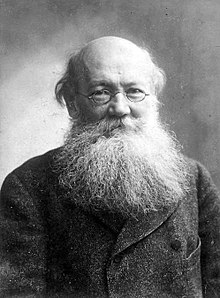Peter Kropotkin
| Peter Kropotkin | |
|---|---|

Kropotkin c. 1900 (aged 57)
|
|
| Born |
Pyotr Alexeyevich Kropotkin December 9, 1842 Moscow, Russian Empire |
| Died | February 8, 1921 (aged 78) Dmitrov, Russian SFSR |
| Alma mater | Saint Petersburg Imperial University (no degree) |
| Era | |
| Region | |
| School | Anarchist communism |
|
Main interests
|
|
|
Notable ideas
|
|
| Signature | |
Prince Pyotr Alexeyevich Kropotkin (/kroʊˈpɒtkɪn, krə-/;Russian: Пётр Алексе́евич Кропо́ткин; December 9, 1842 – February 8, 1921) was a Russian activist, scientist, and philosopher, who advocated anarchism. Kropotkin was a proponent of a decentralised communist society free from central government and based on voluntary associations of self-governing communities and worker-run enterprises. He wrote many books, pamphlets and articles, the most prominent being The Conquest of Bread and Fields, Factories and Workshops, and his principal scientific offering, Mutual Aid: A Factor of Evolution. He also contributed the article on anarchism to the Encyclopædia Britannica Eleventh Edition, and left unfinished a work on anarchist ethical philosophy.
Kropotkin was born in Moscow, into the second-highest level of the Russian aristocracy. His mother was the daughter of a Cossack general. His father, Alexei Petrovich Kropotkin, was a prince in Smolensk, of the Rurik dynasty which had ruled Russia before the rise of the Romanovs. Kropotkin's father owned large tracts of land and nearly 1,200 male serfs in three provinces.
...
Wikipedia
